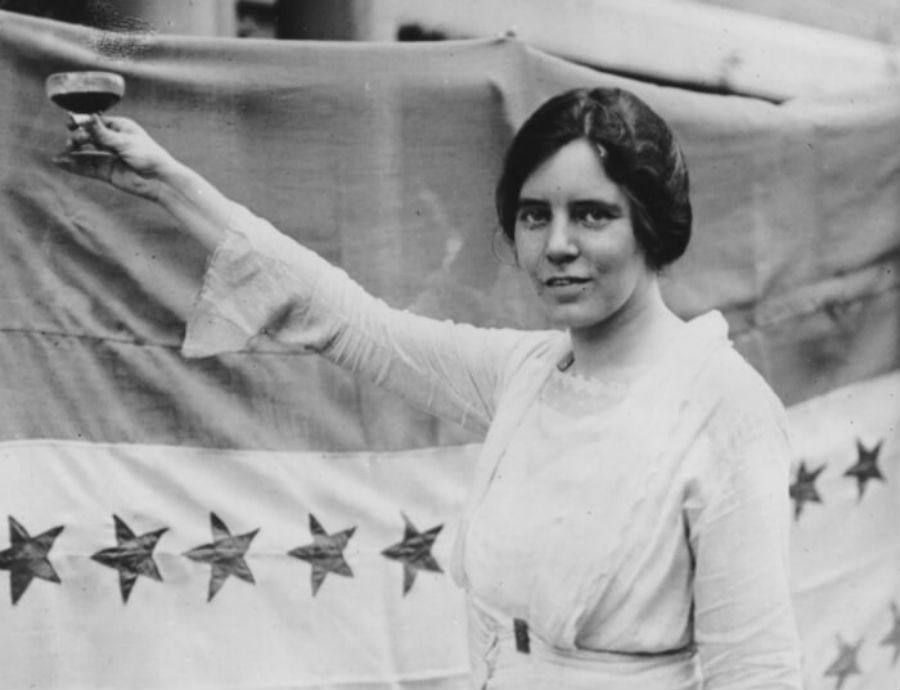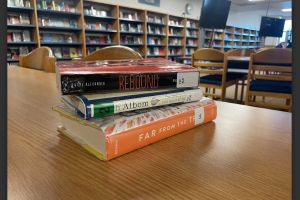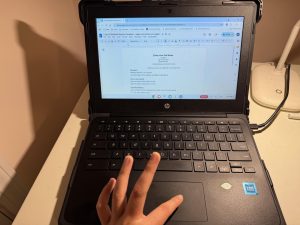Woman of the Month: Paul Enfranchises Women
Alice Paul, mother of the suffrage movement in America
January 13, 2020
Alice Paul is the mother of the suffrage movement in America; she devoted her life to achieving equality for all genders.
From a young age, Paul was taught that both sexes were equal. As she grew up, her mother exposed her to the concept of women’s suffrage and took her to suffrage meetings in her hometown of Moorestown, New Jersey.
Following in the footsteps of her mother, Paul attended Swarthmore College in Pennsylvania, where she was introduced to economics and politics in her senior year. Upon her graduation, Paul held a fellowship at the New York School of Philanthropy studying social work.
In 1907, Paul received a fellowship at the University of Birmingham in Woodbridge, England, where she met Christabel Pankhurst, the daughter of British suffragist leader Emmeline Pankhurst. Paul became intrigued by the militant strategies of the feminists in Britain, working for the Women’s Social and Political Union for two years.
In 1910, upon her arrest and brief incarceration for her suffrage campaigns, Paul returned to America, bringing her new views with her.
At the 1910 National American Woman Suffrage Association (NAWSA) convention, Paul introduced the women to the more aggressive approach of the British suffragists. Despite the resistance of NAWSA as a whole, Paul’s speech gained her the support of the younger activists, who were inspired by her optimism.
In 1913, along with Vassar graduate Lucy Burns, Paul gained leadership of NAWSA’s Congressional Committee and commenced her crusade for an amendment to enfranchise the women of America.
The first order of Paul’s committee was to gain the support of President Woodrow Wilson. On the day before Wilson’s inauguration, Alice’s suffragists marched through Washington, D.C. She hoped to inform Wilson of their willingness to hold him accountable for their enfranchisement and to garner publicity for the cause.
Unfortunately, despite her efforts to keep the march peaceful and orderly, the protestors were assaulted by a disgruntled crowd. Paul was outraged at the lack of response by police forces, as officers looked on as the women were attacked.
Nevertheless, Paul continued to press the white house for legislation. Days following the march, the committee sent a delegation to meet with the president, who requested “more time to consider the matter of women’s suffrage” (Alice Paul).
Soon, Paul met with resistance from NAWSA, who feared her actions would impede their efforts at the state level and was never truly on board with her goal of a constitutional amendment.
Forced to either abandon her combative tactics and vision of an amendment or leave, Paul and Burns left NAWSA and formed the National Woman’s Party (NWP).
No longer restricted by NAWSA, Alice’s efforts became more aggressive. In January 1917, the NWP became the first group to picket the White House; members were posted outside the White House for a year and a half. With America entering World War I, Paul asserted that “America’s involvement in a war for democracy had no moral ground if the nation refused to grant all of its citizens the right to vote” (Alice Paul).
Soon, the NWP’s actions resulted in arrests. In June 1817, the NWP’s co-founder Lucy Burns was arrested but later released. As more and more women were arrested, sentences got heavier, with sixteen women forced to spend sixty days at Occoquan Workhouse, including Paul, who was arrested in October.
Conditions at the prison were abysmal. The living provisions were unsanitary, food was infested, and the women were routinely abused and tormented. By the end of October, Alice and a fellow suffragist began a hunger strike in protest of their maltreatment. “Over the next three weeks, three times each day, Paul and Winslow were force-fed; tubes were pushed into their noses and down their throats. In addition, Paul was moved to a psychiatric ward where she was monitored day and night by an attendant holding a flashlight up to her face” (Alice Paul). Soon, it became clear to the public, the women were being singled out.
President Wilson, tired of the NWP’s tactics, declared support for the suffrage amendment, and in 1920, the amendment was ratified.
But Alice was not done yet. Inspired by her belief that “‘men and women shall have equal rights throughout the United States’” (Alice Paul), she drafted the Equal Rights Amendment (ERA).
Equal Rights Amendment, by Alice Paul
“ Section 1. Women shall have equal rights in the United States and every place subject to its jurisdiction. Equality of rights under the law shall not be denied or abridged by the United States or by any State on account of sex.
“ Section 2. Congress and the several States shall have the power to enforce, by appropriate legislation, the provisions of this article.
“ Section 3. This amendment shall take effect two years after the date of ratification.”.
Despite Alice’s efforts, the amendment was defeated, “ending the movement to provide women with a constitutional right to equal justice” (Alice Paul).
Alice Paul devoted the entirety of her life to achieving equal rights. Almost one-hundred years ago, her dream was achieved. Despite the lack of support from the women of NAWSA, she never once questioned her dreams or her devotion to those dreams. When I turn eighteen and am allowed to register to vote, it will all be because of the actions taken by Alice Paul and the NWP. Alice and the other women of the NWP suffered, through abuse in prisons, through the criticism of their fellow women for their aggressive actions, to provide the young women of America with the opportunity to participate in political and social decisions. No longer are women silenced by their inability to participate; Alice Paul removed the barriers that smothered women’s voices.
Despite the enfranchisement of women, the defeat of the ERA means women are still not equal to men. The women of today, the 21st century, are living in a society where they are not legally viewed as equals. No matter what is told to the young women of America, that they are equal, they deserve to be treated the same way as everyone else, in the eyes of the law, those statements are false. By continuing to prevent women from being equal to men we are teaching our children that it is alright to tell young girls that “every time you speak, I assume you’re false because you’re a girl”. When I spoke to young men in my community about their opinion on empowering women, some admitted that they did not believe they needed to know how to do that because the careers they were going into would not require that type of skill.
The young men of the future are not the only people affected by these notions. Young women have become complacent in their inferiority. The ERA was not an amendment defeated by a group of men. Rather, it was defeated by a group of women who feared the loss of their status as a protected class. Women were so fearful of the loss of protections like alimony, exemption from the draft, and the near-guarantee of the acquisition of custody in custody cases, they prevented women from acquiring equality in the workplace (equal pay), the eyes of the law, etc. (The Equal Rights Amendment)
So I ask you: How can a group that is “inferior” in our country, be placed above their “superiors” in a court of law, so much so, that it is the expectation? How can a group that does not warrant equal treatment, that one could argue is “inferior”, be less disposable than those who do hold equal rights?








